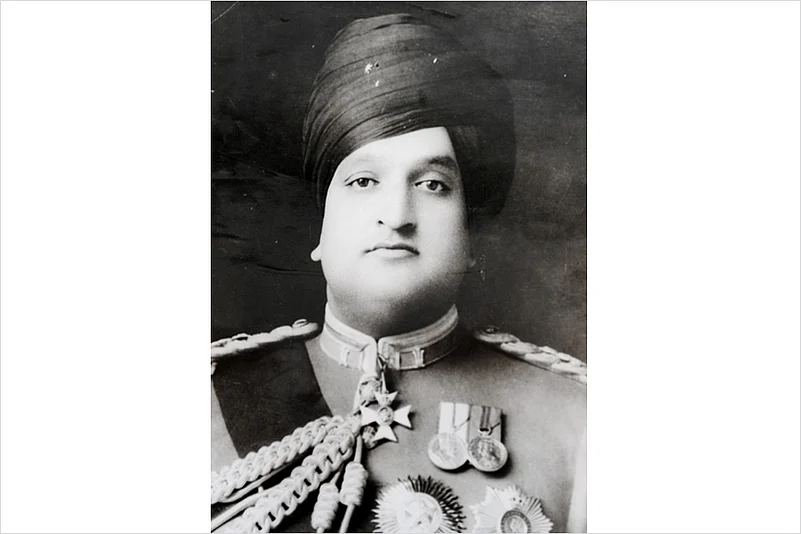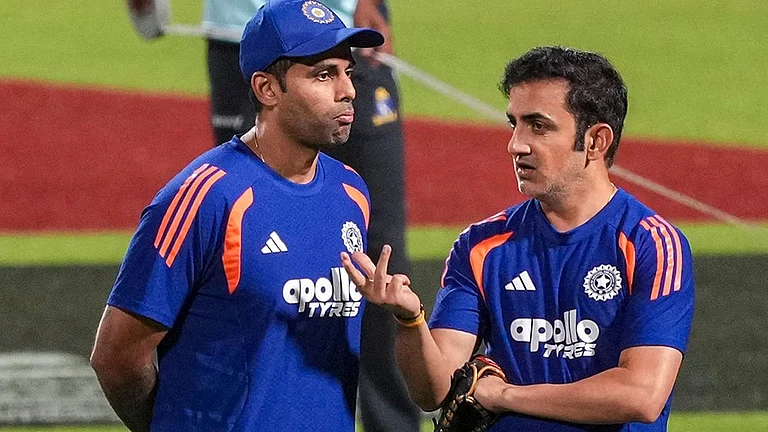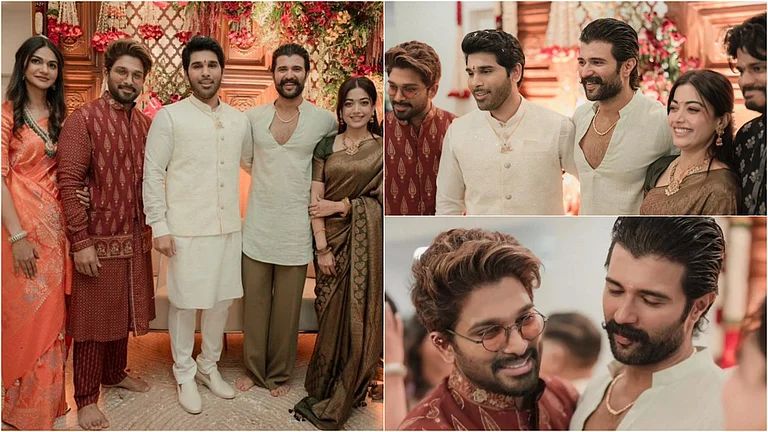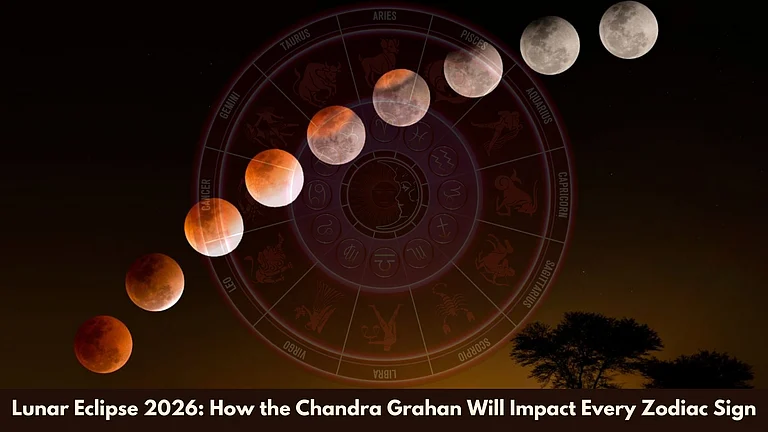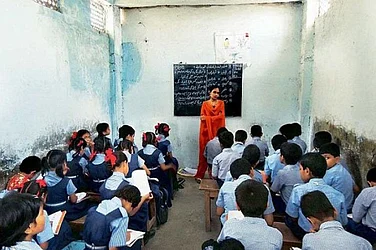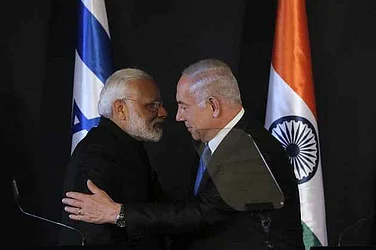As the Upper House of the Jammu and Kashmir assembly—the legislative council—passed a resolution to observe a holiday on September 23, birthday of Maharaja Hari Singh, the last monarch of the princely state, there was no protest call from separatist groups, not even a statement. To them, it was a non-event that has further weakened the position of pro-India ‘mainstream’ parties in Kashmir.
Indeed, the National Conference was left red-faced when its Jammu provincial president Davindar Singh Rana, who is also former CM Omar Abdullah’s confidant and aide, welcomed the resolution, followed by senior party leaders distancing themselves from him. “The resolution”, an unfazed Rana tells Outlook, “represents the sentiments of the Jammu Dogras and we must respect it.” Omar tactfully did not say a word for or against, leaving it to the party’s Valley-based leaders to do the firefighting by criticising the resolution.
The regional political parties found themselves in a tight spot trying to defend a resolution that flies in the face of their grandstanding on the Kashmir conflict. For instance, on July 13 last year, CM Mehbooba Mufti had placed floral wreaths on the graves of 21 Kashmiris killed by Hari Singh’s forces in 1931, outside Srinagar’s central jail. The maharaja whom J&K’s legislative council wants to commemorate had got a Kashmiri leader Abdul Qadir arrested for calling upon the people to fight the “oppressive” Dogra monarchy—with sticks and stones if guns were not available.
When people protested against the arrest, the maharaja’s forces opened fire, drawing first blood in Kashmir’s long history of street agitations against the Dogra rulers. Omar’s grandfather, Sheikh Mohammad Abdullah, who went on to become the first Kashmiri prime minister of Jammu and Kashmir, would later compare the political impact of this massacre on the Kashmiri movement against monarchy with the effect that the Jallianwala Bagh massacre had on the larger freedom struggle. The day is observed every year as a state holiday in Kashmir, with the CM, other ministers and Opposition leaders visiting the graves to pay homage to the martyrs.
It was after the PDP formed the government in alliance with the BJP that for the first time the state had ministers—all from the BJP—who refused to participate in the official Martyrs’ Day function, exposing a faultline within the ruling coalition. When Mehbooba visited the graves in Old Srinagar last year, it was five days after the killing of Hizbul Mujahideen commander Burhan Wani that had triggered widespread protests across the Valley. She described them as brave heroes who laid down their lives in the fight against autocracy, in the process laying the foundation for democracy in the region. Later that day, she said it was one of the greatest chapters in the history of Jammu and Kashmir.
But, when on January 25, BJP legislator and the maharaja’s grandson Ajatshatru Singh moved the resolution in the Upper House, Surinder Choudhary from Mehbooba’s party seconded it. Deputy chairman of the House, Jahangir Mir from the Congress, and forest minister Lal Singh supported the resolution. Incidentally, Ajatshatru was a minister in Farooq Abdullah’s NC government from 1996 to 2001.
Education minister Naeem Akhtar, a senior PDP leader and spokesman of the government, told the House that the maharaja deserves credit for maintaining the secular character of the state. He said the maharaja was also responsible for bringing in Article 370, which helps in maintaining the state’s identity and keeping cultural erosion in check. Effusive in his praise for the monarch, he said the state should, in fact, do more than just declare his birth anniversary a holiday. He hoped after his gushing tribute, Ajatshatru would withdraw the resolution. Instead, it was put to vote and passed, with only two PDP members abstaining.

Mehbooba Mufti honours Kashmiris killed by the forces of Maharaja Hari Singh on July 13, 1931
A seething NC general secretary and brother of Farooq, Mustafa Kamal, whose statements were previously disowned even by Omar, tells Outlook that Dogra rule was a curse on Kashmiris, who were “driven like dumb cattle and faced hardship and tyranny”. “The resolution is aimed at portraying a rosy picture of a dark chapter of Kashmir’s history, which started with the ignominious Treaty of Amritsar,” says Kamal. “It is an insult to the struggle of Kashmiris and I believe there are ulterior motives behind it.”
Dogra rule over Jammu and Kashmir began in 1846, with the Treaty of Amritsar, after the defeat of the Sikhs in the First Anglo-Sikh War. Historians say Gulab Singh (1792-1857), the first in the line of the Dogra kings, was rewarded by the British Raj for betraying the Sikhs in the war. He was allowed to “purchase” the territory spread over 84,771 square miles and home to 2.5 million people for 50 lakh (nanakshahi) Rupees. In 1946, Sheikh Abdullah, father of Farooq and Kamal, launched the ‘Quit Kashmir’ movement against the maharaja’s rule.
“Once you go through the 100-year history of the monarchy, you will realise whether he was greater or Sheikh Abdullah,” says BJP general secretary Ashok Koul. “These days, leaders of the National Conference talk about the state subject laws. But it was the Dogra rulers who introduced them. The maharajas contributed to education, health and other sectors, while the NC has done nothing during its rule.”
About the killings on July 13, 1931, Koul says, the last maharaja’s son and Rajya Sabha MP, Karan Singh, is more right than any historian. Two days after the resolution was passed by the legislative council, Karan Singh welcomed it and slammed those who “attempt to brand” the state’s erstwhile ruler as “communal”. In a function at Jammu, the Congress leader held the NC responsible for spreading “poisonous rumours” about his father and Dogra rule in the state.
“Peace prevailed in the state during the rule of the Dogras,” said Karan Singh. “In 100 years of Dogra rule, bullets were fired only once—and that too because the shops of Kashmiri Pandits were probably being looted. Some people were killed in the firing and that is being observed as Martyrs’ Day.”
Karan Singh claimed that when his father came to power, he had said “justice” was his religion and that his closest friends were Muslims. There were always Muslims in his staff. He called his father a “progressive” leader who carried out several reforms.
As ‘mainstream’ political leaders get entangled in a war of words over Maharaja Hari Singh’s legacy, the separatists are calmly watching from a distance. They seem happy that the resolution has pulled the rug from under the feet of the regional ‘mainstream’ parties, which insist that the protest of July 13, 1931, and other struggles against Dogra rule culminated in 1947 with the advent of democracy in Jammu and Kashmir. They see the resolution as underlining the political defeat of these parties.
“We believe our struggle continues since 1931,” Mirwaiz Umer Farooq, head of the moderate faction of Hurriyat Conference, tells Outlook. “We fought against Dogra rule and we have been fighting against the so-called democratic aggression of India since 1947. For us, there is no difference between the Dogra rulers and their current avatars.”
For decades, pro-India political parties, especially the NC, have been arguing that their struggle against the maharaja led to democratic rule under India. “Now, they have to celebrate autocratic rulers in this so-called democracy,” says Mirwaiz, summing up the separatists’ take on the matter.
By Naseer Ganai in Srinagar






